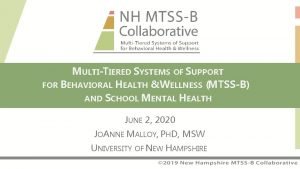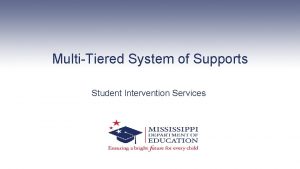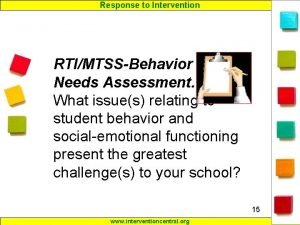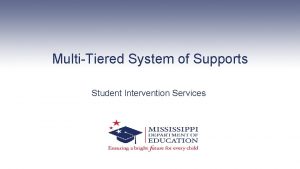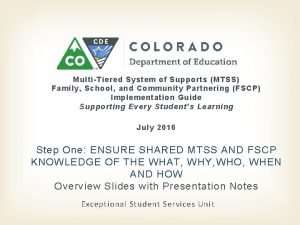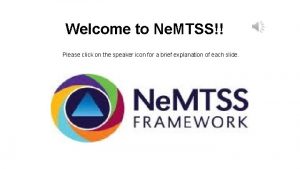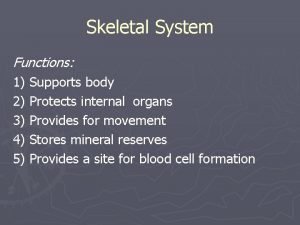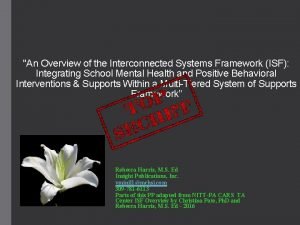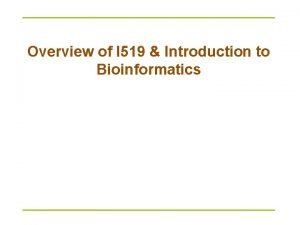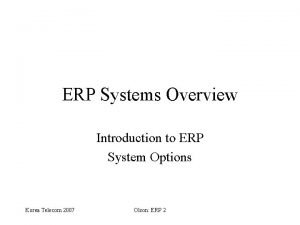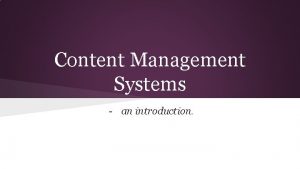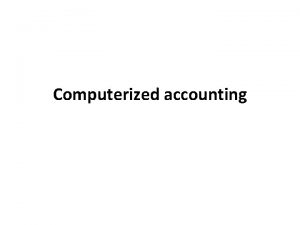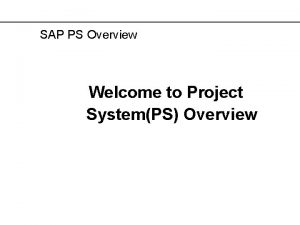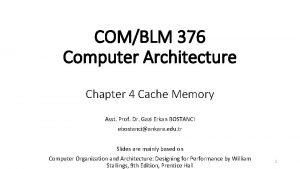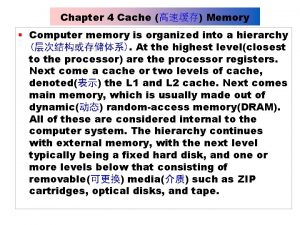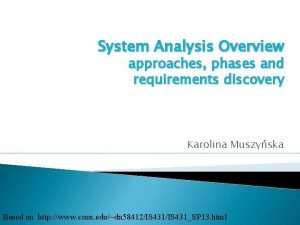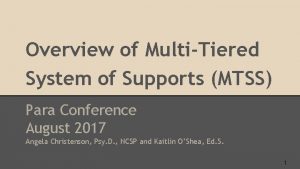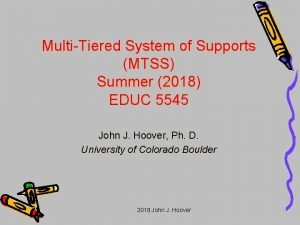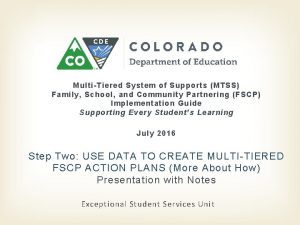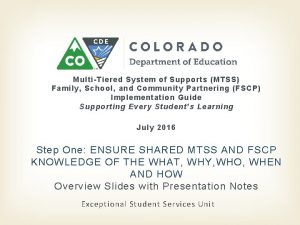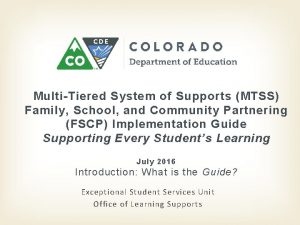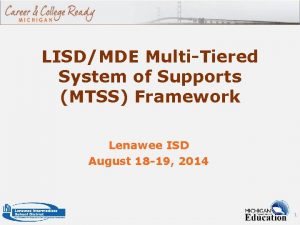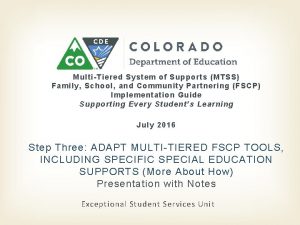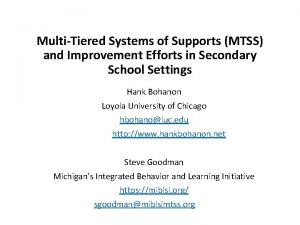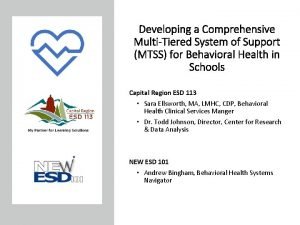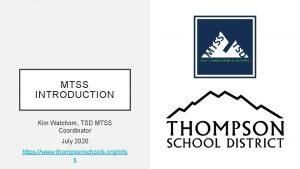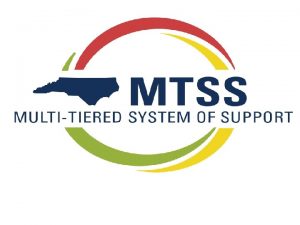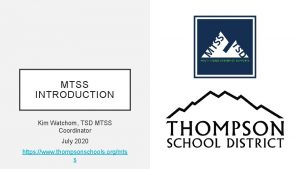Introduction Overview of MultiTiered System of Supports MTSS
































- Slides: 32

Introduction Overview of Multi-Tiered System of Supports (MTSS)

Framework and Process of MTSS

MTSS Framework • Provides an integrated system to support the academic and behavioral needs of students • Uses assessment data to drive differentiated instruction for all students • Assists with identifying students in need of additional support • Provides students experiencing difficulty with additional evidence-based intervention support to reduce the widening of academic and behavioral skillset gaps • Promotes collaboration among teachers • Communicates student progress to caregivers

MTSS vs. Other Support Systems MTSS • Encompasses supports for the whole child • Accounts for academics, behavior, and mental health support Other Support Systems • Response to intervention (RTI) usually describes academic supports. • Positive behavioral interventions and supports (PBIS) usually describes behavioral supports. Texas Education Agency (TEA), n. d.

Model UNIVERSAL TARGETED INTENSIVE

Universal Intervention • Also known as Tier 1 or primary prevention UNIVERSAL • Designed for all students • Occurs in general education classroom • Almost all students participate • ~80% of students need only universal intervention

Targeted Intervention • Also known as Tier 2 or secondary prevention UNIVERSAL TARGETED • Designed for students experiencing difficulty in academics or behavior • Can occur inside or outside of the classroom in small groups • Provided in conjunction with universal intervention • ~20% of students may require targeted intervention

Intensive Intervention • Also known as Tier 3 or tertiary prevention UNIVERSAL TARGETED INTENSIVE • Designed for students who demonstrate inadequate response to universal and targeted intervention • ~5% or less of students require intensive intervention

Model UNIVERSAL TARGETED INTENSIVE

Components UNIVERSAL • Universal evidence-based practices • Screening of all students • Progress monitoring of atrisk students • Data-based decision making TARGETED • Targeted evidence-based practices • Progress monitoring • Data-based decision making INTENSIVE • • Diagnostics Intensive evidence-based practices Progress monitoring Data-based decision making

Common Components Across the Tiers Evidence-Based Practices Instructional techniques supported by high-quality research demonstrating meaningful effects on student outcomes UNIVERSAL • Universal evidence-based practices • Screening of all students • Progress monitoring of atrisk students • Data-based decision making TARGETED • Targeted evidence-based practices • Progress monitoring • Data-based decision making INTENSIVE • • Diagnostics Intensive evidence-based practices Progress monitoring Data-based decision making Cook & Cook, 2013

Common Components Across the Tiers Progress Monitoring Using reliable and valid assessments to determine adequacy of response to intervention UNIVERSAL • Universal evidence-based practices • Screening of all students • Progress monitoring of atrisk students • Data-based decision making TARGETED • Targeted evidence-based practices • Progress monitoring • Data-based decision making INTENSIVE • • Diagnostics Intensive evidence-based practices Progress monitoring Data-based decision making

Common Components Across the Tiers Data-Based Decision Making decisions about adequacy of student response using data from progress-monitoring measures UNIVERSAL • Universal evidence-based practices • Screening of all students • Progress monitoring of atrisk students • Data-based decision making TARGETED • Targeted evidence-based practices • Progress monitoring • Data-based decision making INTENSIVE • • Diagnostics Intensive evidence-based practices Progress monitoring Data-based decision making

Differentiated Components UNIVERSAL • Universal evidence-based practices • Screening of all students • Progress monitoring of atrisk students • Data-based decision making TARGETED • Targeted evidence-based practices • Progress monitoring • Data-based decision making INTENSIVE • • Diagnostics Intensive evidence-based practices Progress monitoring Data-based decision making

MTSS Process UNIVERSAL • Universal evidence-based practices • Screening of all students • Progress monitoring of atrisk students • Data-based decision making TARGETED • Targeted evidence-based practices • Progress monitoring • Data-based decision making INTENSIVE • • Diagnostics Intensive evidence-based practices Progress monitoring Data-based decision making

MTSS Process: Universal Intervention UNIVERSAL • Universal evidence-based practices • Screening of all students • Progress monitoring of atrisk students • Data-based decision making • Teachers have evidence-based practices in place in the general education setting. • To identify students who may be at risk in academics and/or behavior, teachers screen all students. • Teachers conduct regular progress monitoring of at-risk students to determine response to universal intervention. • Problem-solving teams use data-based decision making to determine whether a student is making adequate progress.

MTSS Process: Universal to Targeted Students with adequate response continue in universal intervention. UNIVERSAL • Universal evidence-based practices • Screening of all students • Progress monitoring of atrisk students • Data-based decision making TARGETED • Targeted evidence-based practices • Progress monitoring • Data-based decision making INTENSIVE • • Diagnostics Intensive evidence-based practices Progress monitoring Data-based decision making Students with inadequate response start to receive targeted intervention.

MTSS Process: Targeted Intervention TARGETED • Targeted evidence-based practices • Progress monitoring • Data-based decision making • Teachers use evidence-based practices within smallgroup intervention. Intervention occurs frequently. • Teachers progress monitor students to determine response to targeted intervention. • Problem-solving teams use timely data-based decision making about student response to intervention.

MTSS Process: Targeted to Intensive Students with adequate response continue with targeted intervention. UNIVERSAL • Universal evidence-based practices • Screening of all students • Progress monitoring of atrisk students • Data-based decision making TARGETED • Targeted evidence-based practices • Progress monitoring • Data-based decision making INTENSIVE • • Diagnostics Intensive evidence-based practices Progress monitoring Data-based decision making Students with inadequate response start to receive intensive intervention.

MTSS Process: Intensive Intervention • Diagnostics conducted to determine how to adapt intervention INTENSIVE • • Diagnostics Intensive evidence-based practices Progress monitoring Data-based decision making • Evidence-based practices used within intervention; intervention occurs frequently • Progress monitoring of students to determine response to intensive intervention • Timely data-based decision making about student response

Review: MTSS Tiers, Components, and Distribution MTSS Tiers and Components MTSS Distribution

Your School’s MTSS Model UNIVERSAL TARGETED INTENSIVE

Important Considerations for MTSS

Determining Instructors • Classroom teachers provide universal intervention for all students. • Each school determines who provides targeted intervention (e. g. , classroom teacher, specialized teacher, instructional support staff member, interventionist) and who provides intensive intervention (e. g. , specialized teacher, special education teacher).

Professional Learning Ongoing professional learning is essential at all tiers. Professional learning provides all teachers with the necessary tools to ensure that every student receives high-quality intervention.

Evidence-Based Practices • Teachers must have access to evidence-based materials and know how to implement evidence-based practices. • If evidence-based practices are not currently used, school leaders and teachers must know how to evaluate the evidence base of a practice.

Assessments • Teachers must also have access to high-quality screeners, progress-monitoring measures, and diagnostics with an evidence base. • If such measures are not currently used, teachers must know how to evaluate the evidence base of an assessment.

Data-Based Decision Making Is Key If you aren’t consistently collecting and using various forms of data for decision making, you are not implementing MTSS.

Summary

MTSS Model UNIVERSAL TARGETED INTENSIVE

MTSS Components UNIVERSAL • Universal evidence-based practices • Screening of all students • Progress monitoring of atrisk students • Data-based decision making TARGETED • Targeted evidence-based practices • Progress monitoring • Data-based decision making INTENSIVE • • Diagnostics Intensive evidence-based practices Progress monitoring Data-based decision making

 Mtss and udl
Mtss and udl Mtss memes
Mtss memes Mtss-b
Mtss-b Symphonylearning com
Symphonylearning com Mtss needs assessment
Mtss needs assessment Mtss documentation packet
Mtss documentation packet Benefits of mtss
Benefits of mtss Mtss
Mtss Mtss nebraska
Mtss nebraska Decreto 283/996
Decreto 283/996 Mtss infographic
Mtss infographic Social emotional learning standards indiana
Social emotional learning standards indiana What system supports the body
What system supports the body Interconnected systems framework
Interconnected systems framework Multicullar
Multicullar Papercut job ticketing
Papercut job ticketing Introduction product overview
Introduction product overview Introduction product overview
Introduction product overview Introduction product overview
Introduction product overview Introduction to erp systems
Introduction to erp systems Content database software
Content database software Computer accounting systems
Computer accounting systems Overview of the digestive system
Overview of the digestive system Sap easy cost planning
Sap easy cost planning Operating systems overview
Operating systems overview Class diagram gym management system
Class diagram gym management system Exercise 38
Exercise 38 Set associative mapping in cache memory
Set associative mapping in cache memory Computer memory system overview
Computer memory system overview British school system
British school system Financial intermediaries
Financial intermediaries British school system overview
British school system overview System analysis
System analysis


